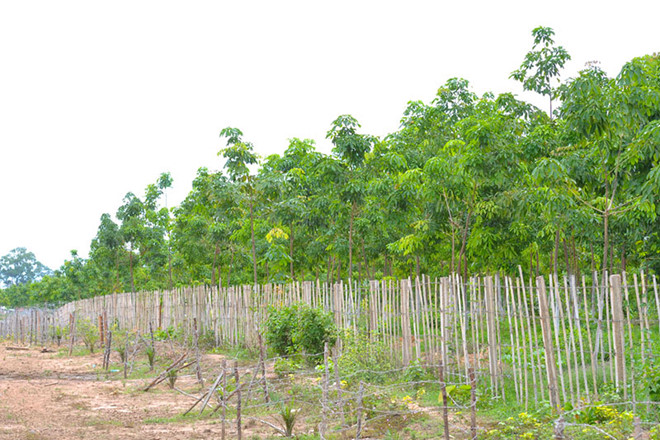Central Bank offers helping hand to debt-laden Hoang Anh Gia Lai
 |
The document, according to newswire TBKTSG Online, included a proposal to keep some of HAG’s debts at the current grades, to provide an extension of the repayment of the principal and the interest, and to decrease or forgive the interest for these debts, as well as a proposal that SBV refinance the lenders at 6-6.5 per cent per year.
The prime minister is going to make the decision within a week. If the plan is approved, SBV and HAG’s lenders will meet to decide the specifics on how they are going to reschedule HAG’s debts.
Keeping the debts in their current categories instead of downgrading them means that the banks’ bad debt ratio would not increase, while the company’s credit rating would remain the same. If the prime minister greenlights this plan, many people will ask why the government is saving HAG instead of other companies.
The two stocks related to HAG, namely those of the mother company and its subsidiary HAGL Agricultural Joint Stock Company (HNG), rose to the ceiling yesterday after a long spell of decrease. HAG rose VND500 (2 US cent) per share, or 6.8 per cent, ending at VND7,900 (35 US cent). HNG also rose VND500 (2 US cent), also 6.8 per cent, to close at VND7,800 (35 US cent).
HAG’s financial statement showed that as of December 31, 2015, the company held VND32.9 trillion ($1.47 billion) in liabilities, which is twice the owners’ equity. Of this, a debt volume of VND8.297 trillion ($370 million) has payment deadline in 2016. Subsidiary HNG accounted for a little over half of the liabilities.
HAG’s three biggest lenders are Bank for Investment and Development of Vietnam (BIDV) with VND10 trillion ($450 million), Eximbank with VND4 trillion ($180 million), and VPBank with VND2.8 trillion ($130 million).
At BIDV’s shareholders’ meeting held at the end of April, general director Phan Duc Tu replied to shareholders’ question regarding HAG’s debts, saying that HAG only has difficulties paying, but has not “lost the ability to pay.” “If they sell their 50,000 hectares of rubber plantations along the Vietnamese-Lao border, BIDV can recover the money, but this is a matter of national defence,” he said.
BIDV chairman Tran Bac Ha added, “They can sell their projects, and we can get the money back, but if they sell them who is going to continue the projects? We have a responsibility to stabilise the market, instead of tilting it off balance.”
Throughout 2015, HAGL’s shares fell by 122 per cent, compared to the previous year. The group’s market capitalisation slipped from VND17.5 trillion ($777 million) on January 1, 2015 to VND7.9 trillion ($351 million) on January 8, 2016.
| RELATED CONTENTS: | |
| HAGL attempts to offset home losses by foreign expansion | |
| Hoang Anh Gia Lai reports first loss | |
| Clouds of concern descend on HAGL | |
What the stars mean:
★ Poor ★ ★ Promising ★★★ Good ★★★★ Very good ★★★★★ Exceptional
Latest News
More News
- Citi sharpens its focus on institutional banking (February 09, 2026 | 19:58)
- SSC steps up engagement with FTSE Russell on market reforms (February 09, 2026 | 17:33)
- IFC considers $50m trade finance guarantee facility for Nam A Bank (February 09, 2026 | 17:28)
- Hoa Phat Agricultural Development debuts shares on HSX (February 06, 2026 | 14:00)
- Vietcap’s VAD 2026 draws strong global investor turnout (February 06, 2026 | 13:30)
- New rules ease foreign access to Vietnam equities (February 05, 2026 | 17:29)
- 0.1 per cent tax proposed on each transfer of digital assets (February 05, 2026 | 17:27)
- Ministry of Finance tightens policy delivery at start of year (February 05, 2026 | 17:26)
- Vietnam steps up market reforms as FTSE Russell reviews upgrade progress (February 05, 2026 | 17:20)
- 2025 profits mixed amid strong energy and farming results (February 05, 2026 | 17:18)
















 Mobile Version
Mobile Version